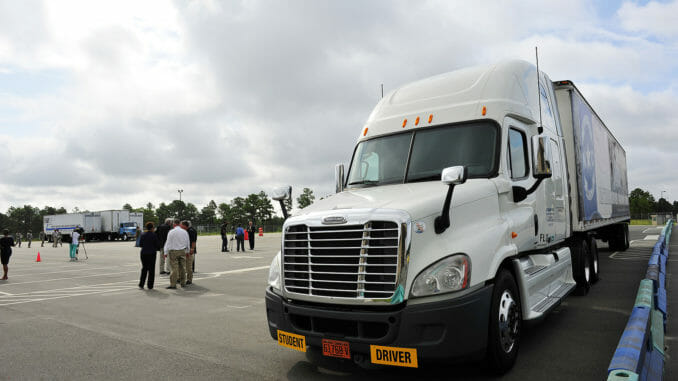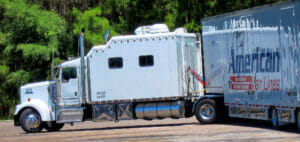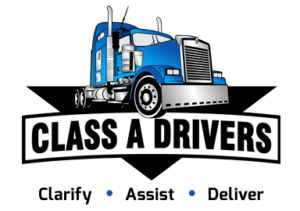
The best way to get your Class A CDL is to go to truck driving school. But how do you know which CDL school is right for you?
Cost is usually the most important factor when choosing a trucking school, and we discussed how to pay for school in the previous chapter. But cost shouldn’t be the only consideration. Where you receive training is a critical decision that affects your entire career.
Before you start looking for a CDL school, you need to look at your personal situation:
- Can you attend full-time or do you need to schedule your CDL training around other obligations like work, family, etc.?
- Can you pay for school and still meet your other financial needs?
- Do you need to be home every night or can you live away from home for a few weeks?
- If you need to be home every night, how far is the nearest truck driving school?
Location, Location, Location
Where you live inevitably affects your choice of where to go to truck driving school.
Major metropolitan areas usually have dozens of schools to choose from. In a rural area, you may have only one school nearby.

Of course, you can go to a training program that’s outside of your region, but this adds additional costs and keeps you away from home and probably your day job.
For example, if you live in rural North Carolina, you might have an 80 mile commute every day to get to the nearest CDL school.
In a situation like this, you have to choose between a long commute and the cost of housing for a school further away.
An 80 mile commute can get you home to see your family, and that might be worth it.
CDL School Should Fit Your Needs
Everyone who wants to become a Class A CDL driver has a different set of needs, and these needs help you determine which school to attend.
If you’re light on cash and heavy on bills, you should consider a school with a fast completion time, which leads to quick employment and a regular paycheck in the shortest period of time possible. When money isn’t a concern, you can be far more selective and pick the school with the best equipment or highest-rated instructors.
Trucking School and Your Career
Keep in mind your ultimate job and career goals. If you’re looking to be an over-the-road driver that gets home on weekends, don’t pick a school whose only equipment is a day cab and 48-foot trailer.
Most importantly, consider the school’s job placement rate or placement guarantees. Ask how often the CDL school holds job fairs and ask which trucking companies attend. If you want to haul a specific type of freight, check if your school has good placement with trucking companies that deliver that freight.
Cost

The cost to become a CDL Class A driver is usually the biggest consideration, and the price of the training program is only one potential cost.
Here are a few additional expenses that you might encounter:
- If attending a school out of your region, you’ll need meals and a place to stay.
- If you are commuting from home, what is the cost of that? Gas prices can add up quickly if you drive far distances, five days a week for seven weeks.
- The fees for permits, physicals, drug testing, etc.
If you choose to go to a company-sponsored school, that will pay for your training, but you’ll be placed immediately with that specific trucking company.
Make sure you can live on the salary of whichever trucking company you sign up for.
Other Considerations for Truck Driving School
Before you decide to spend your hard-earned money and time on trucking school, here are a few other questions to ask:
- Is the school accredited and fully licensed?
- Does the program meet PTDI standards?
[Note: The Professional Truck Driver Institute sets industry standards in CDL training that exceeds government minimums. This type of training offers the highest quality of training and level of satisfaction for both companies and students.] - Does the school have its own practice area?
- How much classroom time compared to how much driving time you get?
- Do they have day and night driving classes?
- What equipment and trucks do you get to use?
- How many students per instructor? (We recommend a teaching environment with 2 students per instructor.)
Your goal is to receive the best education you can get with lots of time behind the wheel. Aim for a minimum of 32 hours of driving time. Keep in mind that this experience not only helps you get a job, but it also keeps you safe on the road!
Also ask the schools what happens if you don’t pass your CDL exam the first time. Most top-rated schools offer a guarantee that you will pass the first time. If you don’t, you should be able to repeat the training at no additional cost or get your money back.
For Company-Sponsored CDL School
If you attend a company-sponsored training program, you will have different questions than for private schools. For example, you already know that you will have a driving position at that company, so job placement isn’t an issue.

For company-sponsored schools, you will be speaking to recruiters, and they may ask you to sign forms before they send the final contract to you.
Make sure you are not signing a final contract for work or payment.
Save the email address of the recruiter you have been talking to. After you agree on terms, email the recruiter a recap of the conversation that you had with them.
- You are committed and interested in their company.
- You want to be an over-the-road (long-haul) driver.
- You are evaluating your options,
- You don’t want to commit before seeing the fine print.
- You also need to consider your finances before committing.
Here are the most important questions you should ask:
- What are the qualifications needed to attend the program?
- Will I be allowed to review the training contract before I sign it?
- What is the cost of the training program, and what are my expectations to pay back the costs?
- If I quit the training program at any time, will I be required to repay any or all the training costs?
- How long am I required to stay with the company once I sign the contract?
- If the program is set up for tuition reimbursement, how much will be deducted from each paycheck?
- How much money will I be paid during training, if any? Are meals, room, and board part of my training expenses?
- How much will I be paid once I’m driving? Is the pay per mile, per hour, or percentage of the load?
- What type of equipment will I be driving during training and once I’m driving? How reliable is the equipment?
- How often will I be allowed to go home? How many weeks or months will I be expected to run? How many miles will I be offered each week?
You can also ask company drivers if they know anyone who quit the program and what the repercussions were. Asking that to a recruiter may seem like you’re already thinking about quitting!
More Tips To Choose the Right CDL School for You
- Research the websites of different trucking schools and different trucking companies that offer training.
- Make a list of schools that interest you.
- Do a Better Business Bureau check on schools you might be considering. The more research you do, the more likely you’ll be to make the best school decision.
- Check with your local community or junior college. Many schools offer Class A CDL truck driver training.
- Most truck driving schools don’t publish their rates, so be prepared to fill out lots of forms and make lots of phone calls to find this info.
- Visit a school on your list. This gives you an opportunity to see the school, the equipment, and if they have a driving course on site. Talk with an instructor and a few students if you get the chance.
- If there’s a truck stop in your area, talk to a few drivers to get their views on schools. Ask if they went to school. If so, find out where. Ask if they were satisfied with the school and if they have any tips for you.
- Check online reviews for a variety of trucking schools.
- If you decide to attend a truck driving school outside of the state you reside in, make sure your new CDL is transferable.
After cost, the most critical factor in choosing a CDL school, though, is how successful they are in placing you with a trucking company after graduation. An inexpensive school that graduates you quickly isn’t going to do you much good if their placement success ratio is low.
